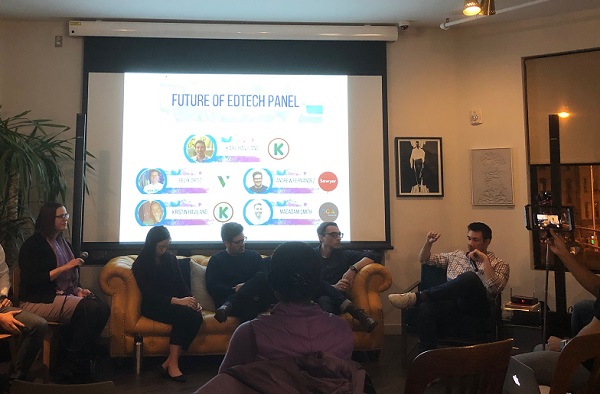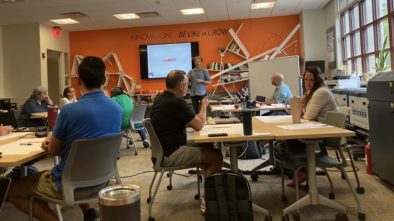Future of EdTech Subject of Thoughtful Conversation at Jersey City Tech Meetup
A diverse panel of professionals connected with the education ecosystem – both in and outside of the classroom – offered an engaging evening of thoughtful, balanced conversation at a recent Jersey City Tech Meetup on the topic of the Future of EdTech.
The discussion was moderated by Karl Haviland, founder of Koding Kurriculum (Jersey City), an EdTech organization that uses GitHub to connect teachers with an open global educational platform designed to help them teach coding skills in the classroom.
Panel participants included Tasha Mosconi, assistant principal, Central Jersey College Prep Charter School (Somerset); Michael Burghoffer, CEO of PicoTech Institute (Jersey City), an after-school learning center for K-8th graders that is primarily focused on teaching tech, engineering and design skills; Andrew Fernandez, cofounder and CTO of Sawyer (Brooklyn, N.Y.), a software-driven organization helping parents and caregivers in local communities to connect with best-in-class providers of activities for their young children; and MacAdam Smith, director of the Content Creators Academy (Jersey City), a nonprofit entrepreneurial mentorship program.
The discussion made it clear that in today’s world of fast-moving technologies, on both the hardware and software sides, it is increasingly challenging for the education ecosystem to keep pace with all the rapid changes.
In some cases, technologies are evolving so fast that what students learn early in the school year may have already changed or become obsolete by the time they are ready to depart for summer vacation.
Many students have more sophisticated desktop computers or laptops in their homes, as well as cutting-edge smartphones that they carry around with them on a daily basis, than what is available in many school classrooms.
Lots of school districts have budgetary constraints that preclude them from investing in the latest hardware and software, and there is also a realistic fear among administrators and teachers that what they do authorize for purchase may soon be outdated.
As a result of the above and other related reasons, there is a growing “digital divide” across the U.S. and around the world. Many students don’t have access to any computers or technology in the classroom, let alone textbooks. The media occasionally report that some teachers are forced to use their own funds to purchase supplies for students, including books.
One of the many positive aspects of classrooms equipped with computers is that children are naturally at different levels of learning, and technology can facilitate their ability to work on assignments at their own pace.
In many of today’s schools, the teacher is more of an organizer, facilitator or taskmaster, as opposed to a lecturer standing in front of a blackboard – or a whiteboard in today’s high-tech world.
Some other key points from the EdTech panel:
- A downside to dependency on technology for young people is that many students’ problem-solving skills are eroding, and this likely comes from having shorter attention spans and being distracted easily. Copying and pasting from Google searches, Wikipedia, Dictionary.com and other internet sources is commonplace, and problematic when research reports are assigned.
- Teaching soft skills is extremely important, and more powerful than just teaching how to utilize modern technology.
- Because today’s young people were born into a world where technology was virtually ubiquitous, many learn how to use and adapt to new hardware and software faster than their teachers or parents.
- Distance and virtual learning are important educational tools, but children pick up valuable socialization skills at school. This includes how to get along with their peers, adults and administrators, skills they wouldn’t get while sitting alone in front of a screen.
- School also provides community, food, shelter and other important benefits to children while their parents are typically out of the home working during the day.
- Parents and caregivers obviously want their offspring to learn a skill set that will prepare them for the future job market. The reality is that nobody really knows what occupations or specific technological abilities will be the most important in the future, when these students finish higher education and are ready to seek employment.
- Writing and understanding cursive writing seems to be one of several skills that have fallen by the wayside in today’s modern classroom. Fortunately, some schools are teaching children important subjects such as managing personal finances, which will better prepare them for the future.
- Many teachers use technology to post homework assignments, upcoming tests, test grades and other important announcements and reminders, which students and parents can track online. This facilitates accountability; it also allows parents to track the progress of their children and to engage in dialogues with teachers by email.
This is the first generation in which the school walls virtually extend into the home, the panelists said, and we have technology to thank for that. Our children are learning many valuable skills inside and outside the classroom, including from enriching after-school programs, but we need more discussion and debate amongst educators, administrators, parents and the students themselves about the impact of EdTech,and how it can best prepare young people for the challenges that the future surely holds.




